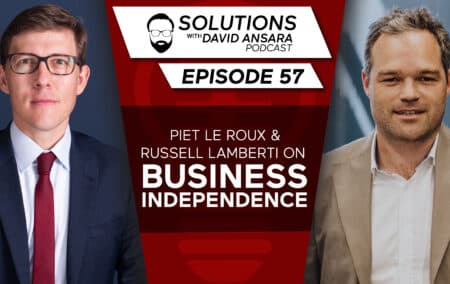Or listen to this episode here:
What is the appropriate role for business to be playing in South Africa, and how can businesses flourish in an environment where the state is becoming increasingly hostile towards the private sector?
In this special in-person edition of the ‘Solutions With David Ansara’ podcast, I speak with Piet le Roux and Russell Lamberti of the business advocacy group, Sakeliga, about building an independent business community in South Africa.
We start the conversation by examining why traditional business advocacy has failed to achieve a more conducive policy environment for private enterprise in South Africa.
I suggest that the consensus-seeking model that has characterised the past four years should give way to a more ‘transactional’ relationship between business and government.
“Asking government more nicely and more urgently to do things differently next time, or even right now, just doesn’t work,” says Piet. “It’s not enough to simply present better policies for government to adopt. We need to come to a point where instead of lobbying for change, we negotiate for change,” he notes.
Piet warns that access to government creates the impression of influence, but it ultimately locks you into a subservient relationship with the government. Instead, Russell argues, the appropriate role of business in the context of a failing state is to balance power, and by doing so, help to achieve a more harmonious economy and society.
We also discuss how the policy of Black Economic Empowerment (BEE) replaces the economic incentives of the market with the perverse incentives of politics. This amounts to a reverse form of ‘state capture’, i.e. capture by the state. “BEE is the capture of the commercial sphere by politicians,” Piet explains.
Russell speaks about South Africa’s deteriorating energy security, and the risk this poses to the economy. He highlights the importance of decentralised approaches to energy production as an alternative to the state’s monopoly.
We conclude by discussing strategies for organisations to achieve true independence from a pernicious state. This requires businesses to be more firm in saying ‘no’ to harmful government interventions and working together to build alternative institutions to the state.

